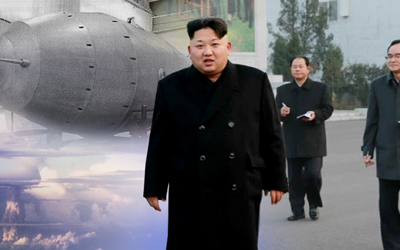- California Assembly OKs highest minimum wage in nation
- S. Korea unveils first graphic cigarette warnings
- US joins with South Korea, Japan in bid to deter North Korea
- LPGA golfer Chun In-gee finally back in action
- S. Korea won’t be top seed in final World Cup qualification round
- US men’s soccer misses 2nd straight Olympics
- US back on track in qualifying with 4-0 win over Guatemala
- High-intensity workout injuries spawn cottage industry
- CDC expands range of Zika mosquitoes into parts of Northeast
- Who knew? ‘The Walking Dead’ is helping families connect
US expert calls for more serious attention to N. Korea’s H-bomb claims

The North’s leader made the H-bomb claims last week, saying the country has become a “powerful nuclear weapons state.” (Yonhap)
WASHINGTON (Yonhap) — The United States should more seriously take North Korean leader Kim Jong-un’s claims that the country has developed hydrogen bombs, an expert said, pointing out that the international community has often incorrectly underestimated Pyongyang’s capabilities.
The North’s leader made the H-bomb claims last week, saying the country has become a “powerful nuclear weapons state.” It was the first time that Kim has publicly mentioned the North’s development of an hydrogen bomb, which uses more advanced technology and is considered much more powerful than conventional nuclear weapons.
But the White House effectively rejected the claims, saying U.S. intelligence “calls into serious question those claims.” Officials in Seoul also expressed skepticism, saying Pyongyang is not believed to have such capabilities when it has not yet mastered the technology to miniaturize nuclear warheads.
“While Kim’s assertion about hydrogen bombs is being met with expert skepticism, experts have frequently underestimated North Korea’s nuclear and missile programs due to ideologically driven analysis, political expediency and the belief that a technologically and economically backward nation could not achieve the necessary breakthroughs,” said Bruce Klingner, a senior Korea expert at the Heritage Foundation.
“Skeptics initially dismissed evidence of North Korea’s plutonium-based nuclear weapons, highly enriched uranium (HEU) program, involvement in constructing a Syrian nuclear reactor and ability to develop long-range missiles,” the expert said in an article to the National Interest magazine.
Klinger argued that the North is already a nuclear threat regardless of the validity of Kim’s hydrogen bomb assertion, adding that the communist nation is believed to have 10-16 nuclear bombs currently and the arsenal could expand to as many as 100 in five years.
Pyongyang’s missile capabilities have made progress big enough to threaten the U.S., he said.
“Experts will assess and debate North Korea’s latest nuclear claim, but the regime already poses a serious and growing nuclear threat to the United States and its allies,” Klinger said.
Jeffrey Lewis, director of the East Asia Nonproliferation Program at the James Martin Center for Nonproliferation Studies, said that it appears to be “a bit of a stretch” for the North to build a staged thermonuclear weapon in which the radiation from a fission primary compresses a secondary stage of thermonuclear fuel.
And a more technically plausible scenario is that the North might be experimenting with fusion fuels, such as deuterium or lithium, to boost the yield of a fission explosion, he said.
Still, however, the expert called for caution.
“So, while a staged thermonuclear weapon is likely more than North Korea can, at the moment, achieve technically, it is a mistake to rule out the aspiration by Pyongyang,” he said. “An H-bomb might not conveniently fit our perception of North Korea but perhaps that is Kim’s point.”
















